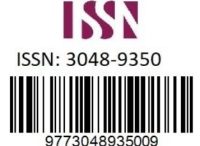International Journal of Advanced Multidisciplinary Application (IJAMA)

Author Benefits
Abstract: The integration of photovoltaic (PV) systems into power grids has increased significantly in recent years due to the global shift toward renewable energy. A critical component in this integration is the solar inverter, which converts the DC output of PV panels into AC power compatible with the grid. The performance of grid-connected solar inverters depends heavily on varying load conditions, which directly influence power quality, efficiency, and stability. This study investigates the behavior of solar inverters under different loading scenarios, including light, medium, and heavy load conditions. Parameters such as total harmonic distortion (THD), inverter efficiency, voltage stability, and reactive power compensation are analyzed. The findings suggest that inverter performance is optimal under medium load conditions, while extreme light or heavy loads lead to increased distortion and reduced efficiency. The study emphasizes the importance of adaptive control strategies and inverter design improvements for reliable grid integration of PV systems.
Keywords: Solar inverter, grid-connected PV systems, variable load, harmonic distortion, inverter efficiency, power quality
References
[1] F. Blaabjerg, R. Teodorescu, M. Liserre, and A. V. Timbus, “Overview of control and grid synchronization for distributed power generation systems,” IEEE Transactions on Industrial Electronics, vol. 53, no. 5, pp. 1398–1409, Oct. 2006.
[2] J. M. Carrasco, L. G. Franquelo, J. T. Bialasiewicz, E. Galván, R. C. Portillo, M. A. Prats, J. I. León, and N. Moreno-Alfonso, “Power-electronic systems for the grid integration of renewable energy sources: A survey,” IEEE Transactions on Industrial Electronics, vol. 53, no. 4, pp. 1002–1016, Aug. 2006.
[3] G. Walker, “Evaluating MPPT converter topologies using a MATLAB PV model,” Journal of Electrical & Electronics Engineering, Australia, vol. 21, no. 1, pp. 49–56, 2001.
[4] H. Villalva and E. Gazoli, “Comprehensive approach to modeling and simulation of photovoltaic arrays,” IEEE Transactions on Power Electronics, vol. 24, no. 5, pp. 1198–120
Contacts
editorinchief.ijama@gmail.com
Working days : Mon- Saturday
Working Hours :9 am -5:30 Pm


